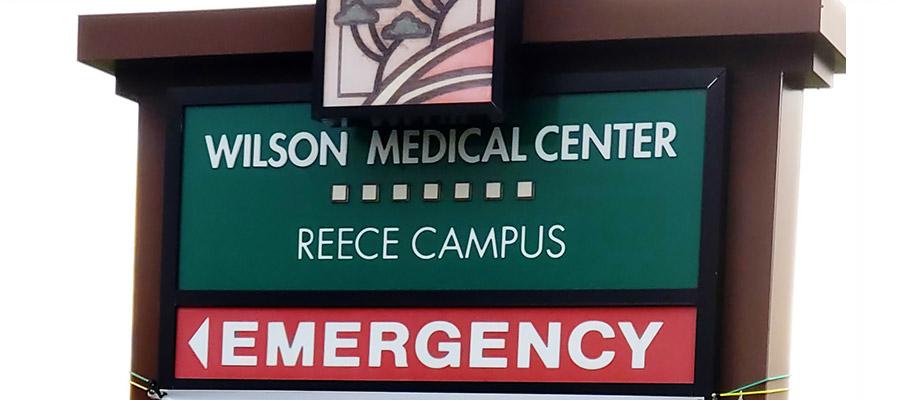A critical access hospital shares tips for managing COVID-19

After Kansas’ governor declared an executive stay-at-home order March 24, Wilson Medical Center, a critical access hospital in Neodesha, Kan., implemented a curbside lab and clinic to help provide safe care to its patients and help stop the spread of the coronavirus. In the days since it launched the curbside clinic care, Wilson Medical Center has learned some invaluable lessons about caring for patients amidst a pandemic. It is also maximizing operations to help its community, which has seen more than 50 negative COVID-19 tests and no positive tests (at the time of this writing). Below are four noteworthy observations from Wilson Medical:
Normalizing patient volume
After COVID-19 hit, WMC saw its clinic volumes drop to around 30% of its pre-COVID-19 volume.
“People were afraid to come to the hospital or clinics to receive care,” said WMC CEO Dennis Shelby.
But now with the combination of a curbside clinic and telehealth services, as well as office visits, its volumes are up to 80% of its pre-COVID-19 visits.
Increased flexibility to care for more patients, quicker
After the Centers for Disease Control and Prevention lifted restrictions on requiring health care organizations performing telehealth services to follow HIPAA-compliant guidelines, WMC experimented with FaceTime and Skype to reach and care for more patients.
Shelby is hopeful the Centers for Medicare & Medicaid Services will authorize reimbursement for telehealth at the standard rural health clinic encounter rate.
Newfound open-mindedness toward telehealth
With a large elderly population, WMC had typically seen patients hesitant – or downright skeptical – toward the idea of telehealth, especially among those in the community not familiar with using technological devices such as iPads to assist with health care. That changed during the COVID-19 pandemic because of WMC’s execution of curbside care and increased reliance on telehealth services.
“We’ve gotten a very good response among the elderly population,” Shelby said. “I’m pleasantly surprised by the number of people now comfortable with telehealth visits.”
He emphasized the importance of walking patients through what they could expect at these appointments in advance. For its curbside care clinic, WMC deploys nursing personnel to speak with the patient and take their vitals; patients are then seen by their provider who can address their medical issues.
Unexpected partnerships
In addition to quickly implementing curbside clinic care and telehealth services, WMC’s leaders knew they had to think outside the box during the pandemic to help ensure staff had the appropriate personal protective equipment. To that end, WMC established a partnership with a local boat manufacturing company to produce PPE such as face shields and washable surgical gowns.
Before WMC reached out, Cobalt Boats, LLC, the renowned boat manufacturer in Neodesha, had closed its plant for about two weeks amidst COVID-19. A conversation between Shelby and Cobalt’s safety officer revealed that Cobalt had the expertise and staff in their upholstery department to help make PPE. The safety officer approached Cobalt administration to see if they might be interested in partnering to produce more PPE for medical staff. To Shelby’s delight, they came back and said, “We want to do this with you and help our community.”
WMC leaders gave Cobalt staff a few models of surgical gowns. They took those back to their plant, digitized the models and returned to WMC with 60 gowns that can be washed up to 10 times.
“Times like these cause us to think creatively and work together with others to develop solutions that will benefit all of us long term,” Shelby said.
Looking ahead and adjusting as needed
Shelby noted that WMC’s success has stemmed from its willingness to adjust things as needed. The hospital has experimented with restricting services and processes, then tweaking policies to allow for more to be done. This includes inviting staff at every level in team huddles, as well as encouraging as many staff members as possible to work from home.
“Just being willing to listen, adjust, try new things and redesign how you are operating is the most important thing,” Shelby said.
While WMC leaders are pleased with the hospital’s operations, they know that more will need to be done to ensure they keep their doors open. WMC is not currently eligible for a Small Business Administration loan at this time because it is a public (county) hospital. WMC leaders hope that Congress will approve public hospitals being eligible for SBA loans.
Currently, WMC has 71 days cash on hand. “The hospital has just received the monies from the CARES Act and has received the accelerated Medicare payment funds, which we want to use judiciously,” Shelby said, “because in 120 days, we’re required to begin paying it back.”
To other critical access hospitals and rural health organizations, Shelby urges staff to step outside of the box and to think creatively about how to provide health care to the communities you serve. It is also important to communicate with your teams daily, and inform your health care workers of the actions taken to protect them, and secure the viability of health care in your community.

